Donald Trump will face trial next month in New York City for faking documents to cover up his sexual affair with porn star Stormy Daniels, becoming the first American president to face a jury on criminal charges.
On Thursday, Justice Juan Merchan refused to dismiss the case and set the trial to start March 25, as previously planned.
Trump’s lead defense lawyer, Todd Blanche, immediately called the decision to keep the start of trial on schedule “a great injustice,” citing the absolute deluge of legal trouble that the former president now faces across the country.
“We have been put... in an impossible position,” Blanche said, citing the “millions of pages of discovery to go through" in three other criminal cases.
But the judge wouldn’t hear it.
“The problem is, you’re not telling me anything you didn’t previously include” in court papers leading up to today’s hearing, Merchan said. “I have made clear this was a date certain.”
“You don’t have a trial date in Georgia. You don’t have a trial date in Florida. Stop interrupting me please!” the judge said.
Trump, who came to court for the hearing, remained relatively still on Thursday. He leaned back in his chair, wearing a blue suit and bright red tie, avoiding the angry courtroom outbursts he became known for during his bank fraud trial late last year.
A years-long investigation by Manhattan District Attorney Alvin Bragg Jr. and his predecessor culminated in a 34-count indictment last year, the first such criminal case against the former president. The case centers on the way Trump coordinated with his personal lawyer, Michael Cohen, to buy the porn star’s silence for $130,000 in the days before the 2016 presidential election–then faked company paperwork at his Trump Organization to disguise the payment.
Although making false business records is a misdemeanor in New York, the state makes that a more serious felony if the fraud is done in furtherance of another crime. The DA was able to elevate those charges to felonies by claiming Trump only covered up the affair to stop it from potentially ruining his already scandal-ridden presidential campaign.
The Stormy Daniels trial is now poised to be Trump’s first criminal one, setting the tone for what he’ll face in D.C. for interfering with the nation's 2020 election, in South Florida for hoarding classified documents at his oceanside Mar-a-Lago mansion-club, and in Georgia for trying to fraudulently flip votes there.
Blanche pleaded with Justice Merchan to reconsider, calling the decision to start trial next month “an unconstitutional violation” and accusing the judge of robbing Trump of spending his time on the road as he competes in the 2024 Republican presidential primaries.
“It’s completely election interference,” Blanche said, later asking, “What about his rights?”
Blanche also tried to justify pushing back the trial by claiming that the "extraordinary media saturation” of Trump news coverage could taint the pool of potential New York City jurors. He noted that the former president spent October, November, and December at a bank fraud trial facing off with the New York Attorney General—only to spend another two weeks at a rape defamation trial against the woman that a jury had determined he sexually abused, E. Jean Carroll.
When Blanche asked Merchan to hit pause and have them all come back in early March, the judge was baffled.
“You think that the saturation will be gone by then?” he said, eliciting laughter in the courtroom. “When? April? May?”
Matthew Colangelo, a senior counsel to the DA and former DOJ official, told the judge that Trump is merely engaging in the same delay tactics his lawyers have tried to use for months: showing judges competing calendars to pit them against each other.
Still, Blanche tried to leverage the upcoming classified documents trial as a reason to hold off on this one, claiming that a prolonged battle in New York would keep him from preparing for a May 20 start in South Florida.
The pretrial hearing took a sharp turn when prosecutors pointed out that Trump’s lawyers—just yesterday—tried to push back deadlines in that other case by arguing the complete opposite: that the classified documents trial’s start date is actually quite flexible. In a Wednesday court filing, Blanche himself wrote to U.S. District Judge Aileen Cannon that her “scheduling order does not suggest that the current trial date is firm.”
Merchan reminded Blanche that he seemed to contradict a “filing made under penalty of perjury.”
This case, like all the others, has been mired in delay attempts by Trump’s legal team as he tries to play judges against each other. Lawyers had also refused to name experts they plan to use at trial. When it initially appeared that his D.C. federal trial might start in early March, the Trump team tried to claim a scheduling conflict with his lead lawyer, Todd Blanche. They even tried to probe Merchan’s private phone call with U.S. District Judge Tanya Chutkan, in which the judges said they simply discussed potential timing conflicts. But Merchan rejected their requests to move around dates and stuck with the plan to have this key meeting just a month ahead of the Manhattan trial.
Ironically, the Trump’s success at slowing down the other cases has completely cleared the way for this one to go forward next month.
This trial threatens Trump in a way that Justice Department Special Counsel Jack Smith’s two cases in D.C. and Florida do not. Those are federal, and Trump could theoretically kill the investigations or pardon himself if his third shot at the presidency manages to win the 2024 election in November. The Manhattan DA is levying state charges, which fall outside the president’s authority in the nation’s federalist system.
Norm Eisen, an attorney who previously helped build the case for Trump’s first impeachment (for abuse of power and obstruction of Congress), stressed the importance of the DA’s case.
“It’s a mistake to think of this as a hush money case only. Trump is charged with 34 counts of falsifying business records to conceal the hush money payments he made to avoid losing the 2016 contest. So it is really an election interference case—the gateway drug to what later developed with election interference in 2020,” Eisen said.
In court on Thursday, the judge also reviewed proposed questions for screening potential jurors at the upcoming trial. Although the task of selecting fair-minded jurors in a case involving this kind of divisive politician has presented theoretical challenges, the jury selection process was relatively quick at the Trump Organization tax fraud trial in 2022 and his separate rape defamation trials in 2023 and 2024.
Jurors in those cases unanimously sided against Trump at trial. Prosecutors suggested that one question be pulled from the recent Carroll rape trial, one that asks whether a potential juror is a member of the conspiracy theory-believing cult QAnon, the leftist antifascist group Antifa, or right-wing groups like the Proud Boys, Oath Keepers, and Three Percenters.
“This is the type of case that may attract people who are against the system on one side or the other. This is an effort to identify and eliminate extremists on both sides,” assistant district attorney Joshua Steinglass said.
However, Trump’s side countered the suggestion, saying that the judge should focus instead on whether jurors simply follow the law.
“We very much oppose this,” Blanche said. “To inflame and inject the names of these fringe groups... that's not done in jury selection in this courthouse.”
In reviewing other proposed questions, the judge appeared reluctant at asking potential jurors too much about their political affiliations or personal views of Trump and his MAGA movement.
“That's not the issue; the issue is whether these people can be fair and impartial,” Merchan said.
Justin Rohrlich contributed to this report.

